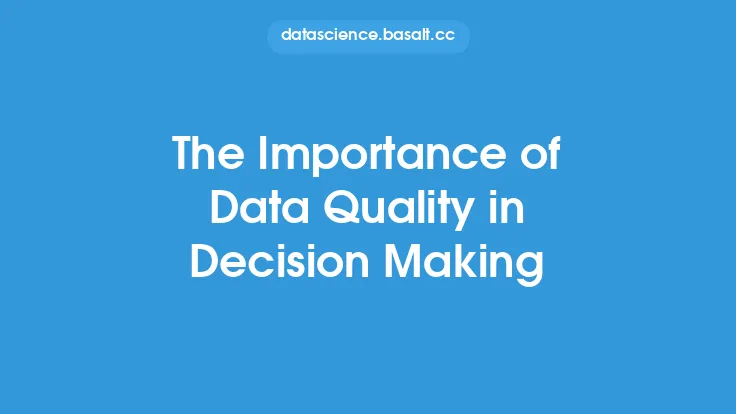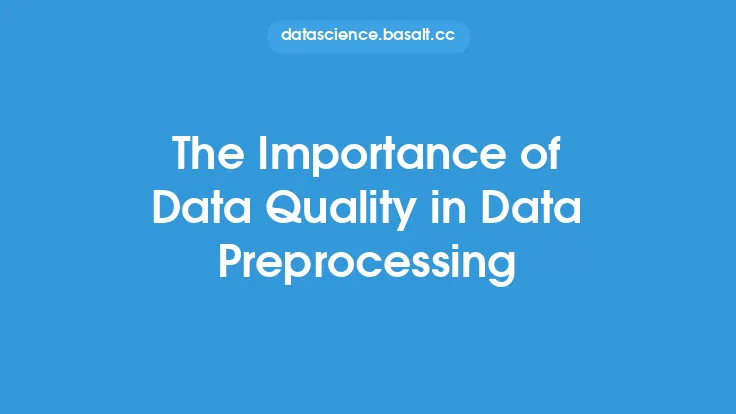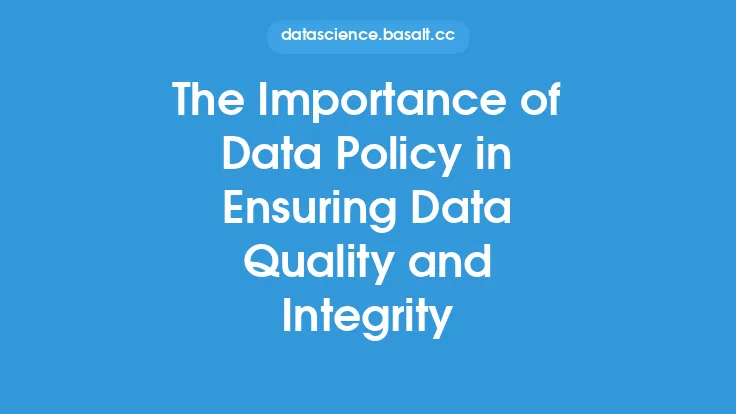Data quality is a critical aspect of data wrangling, as it directly impacts the accuracy and reliability of the insights generated from the data. Data wrangling, also known as data munging, is the process of transforming and preparing raw data into a clean, organized, and structured format for analysis. The goal of data wrangling is to extract valuable insights from the data, but poor data quality can hinder this process and lead to incorrect or misleading conclusions.
Introduction to Data Quality
Data quality refers to the accuracy, completeness, consistency, and reliability of the data. High-quality data is essential for making informed decisions, as it provides a solid foundation for analysis and insights. Data quality issues can arise from various sources, including data entry errors, inconsistent formatting, missing values, and duplicates. These issues can be exacerbated by the increasing volume, velocity, and variety of data, making it challenging to ensure data quality.
Types of Data Quality Issues
There are several types of data quality issues that can affect the accuracy and reliability of the data. These include:
- Inconsistent data: Inconsistent data refers to data that is not formatted consistently, making it difficult to analyze. For example, date fields may be formatted differently, or categorical variables may have different labels.
- Missing data: Missing data refers to data that is not available or is missing from the dataset. This can be due to various reasons, such as non-response or data entry errors.
- Duplicate data: Duplicate data refers to duplicate records or observations in the dataset. This can lead to biased results and incorrect conclusions.
- Noisy data: Noisy data refers to data that contains errors or inconsistencies, such as outliers or incorrect values.
- Inaccurate data: Inaccurate data refers to data that is incorrect or outdated. This can be due to various reasons, such as data entry errors or changes in the data over time.
Consequences of Poor Data Quality
Poor data quality can have significant consequences, including:
- Inaccurate insights: Poor data quality can lead to inaccurate insights and conclusions, which can have serious consequences in business and decision-making.
- Wasted resources: Poor data quality can result in wasted resources, as analysts and data scientists spend more time cleaning and preparing the data rather than analyzing it.
- Lack of trust: Poor data quality can lead to a lack of trust in the data and the insights generated from it, making it challenging to make informed decisions.
- Regulatory issues: Poor data quality can also lead to regulatory issues, as organizations may be required to report accurate and reliable data to regulatory bodies.
Data Quality Metrics
To ensure data quality, it is essential to establish data quality metrics that can be used to measure and monitor data quality. These metrics include:
- Accuracy: Accuracy refers to the degree to which the data is correct and free from errors.
- Completeness: Completeness refers to the degree to which the data is complete and free from missing values.
- Consistency: Consistency refers to the degree to which the data is consistent in terms of formatting and structure.
- Reliability: Reliability refers to the degree to which the data is reliable and free from errors.
Data Quality Checks
To ensure data quality, it is essential to perform regular data quality checks. These checks include:
- Data profiling: Data profiling involves analyzing the data to identify patterns, trends, and anomalies.
- Data validation: Data validation involves checking the data against a set of rules and constraints to ensure that it is accurate and consistent.
- Data cleansing: Data cleansing involves correcting errors and inconsistencies in the data.
- Data normalization: Data normalization involves transforming the data into a consistent format to ensure that it is comparable and analyzable.
Best Practices for Ensuring Data Quality
To ensure data quality, it is essential to follow best practices, including:
- Data standardization: Data standardization involves establishing standards for data formatting and structure to ensure consistency.
- Data documentation: Data documentation involves documenting the data, including its source, structure, and any transformations or changes made to it.
- Data testing: Data testing involves testing the data to ensure that it is accurate and reliable.
- Data monitoring: Data monitoring involves regularly monitoring the data to ensure that it remains accurate and reliable over time.
Tools and Technologies for Data Quality
There are several tools and technologies available to support data quality, including:
- Data quality software: Data quality software, such as Trifacta and Talend, provides a range of tools and features to support data quality, including data profiling, data validation, and data cleansing.
- Data governance platforms: Data governance platforms, such as Collibra and Informatica, provide a range of tools and features to support data governance, including data quality, data security, and data compliance.
- Data integration tools: Data integration tools, such as Apache NiFi and Apache Beam, provide a range of tools and features to support data integration, including data ingestion, data transformation, and data loading.
Conclusion
Data quality is a critical aspect of data wrangling, as it directly impacts the accuracy and reliability of the insights generated from the data. Poor data quality can have significant consequences, including inaccurate insights, wasted resources, and regulatory issues. To ensure data quality, it is essential to establish data quality metrics, perform regular data quality checks, and follow best practices, including data standardization, data documentation, data testing, and data monitoring. By using tools and technologies, such as data quality software, data governance platforms, and data integration tools, organizations can support data quality and ensure that their data is accurate, complete, consistent, and reliable.





